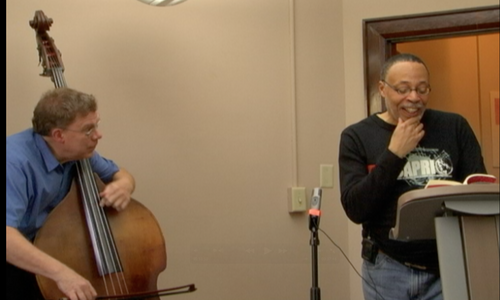George Elliott Clarke

GEORGE ELLIOTT CLARKE
George Elliott Clarke is one of Canada’s most prolific poets. He is also a renowned essayist, scholar, playwright, and, in many ways, a songwriter. His work largely explores and chronicles the experience and history of the black Canadian community of Nova Scotia, creating a cultural geography that Clarke refers to as “Africadia.” Clarke was born in Windsor, Nova Scotia in 1960, near the Black Loyalist community of Three Mile Plains, as a seventh-generation Canadian of African American and Mi’Kmaq Amerindian heritage. He is a graduate of the University of Waterloo, Dalhousie University and Queen’s University, and he is a teacher of Canadian and African Diasporic Literature at the University of Toronto. Clarke’s literary influences are incredibly diverse and range from jazz trumpeter Miles Davis to bassist Charles Mingus, to troubadour-bard Bob Dylan, reactionary modernist Ezra Pound, Black Power orator Malcolm X, and Prime Minister Pierre Elliott Trudeau, among many others.
He has received numerous literary awards for his groundbreaking work, and he was a recent co-recipient of the William P. Hubbard Award (2008) for Race Relations from the City of Toronto for his outstanding achievements and commitment in making a distinct difference in racial relations in Toronto. His many other honours include: the Portia White Prize for Artistic Achievement (1988), Governor-General’s Award for Poetry (2001), the National Magazine Gold Medal for Poetry (2001), the Dr. Martin Luther King Jr. Achievement Award (2004), the Trudeau Fellow Prize (2005), and the Order of Nova Scotia. In 2008, he was named an Officer of the Order of Canada, and was also made an honorary Fellow of the Haliburton Literary Society, the oldest literary society in North America, at the University of King’s College, Halifax.
This month’s Oral History—co-sponsored with the TransCanada Institute and SETS (The School of English and Theatre Studies)—proudly presents George Elliott Clarke for an interview, preceded first with Clarke reading from his latest collection of poetry, Red. On some of the poems, Clarke is accompanied by bassist and ICASP Graduate Fellow, David Lee, for an in the moment improvised performance. Following the reading is an interview with Clarke conducted by PhD student and ICASP researcher Paul Watkins and Postdoctoral Fellow Katherine McLeod of the TransCanada Institute. In the interview Clarke converses about his musical and literary influences, from the Romantics through to the Beat Movement and into African Canadian poetics. Further, Clarke discusses how he crafts his own creative poetic voice and practice in relation to a variety of artist-intellectuals across borders. Watkins and McLeod engage Clarke in critical inquiry about the nature of improvisation and music relative to his work, with a particular focus on the jazz opera, Québécité, produced and performed at the 2003 Guelph Jazz Festival. The interview is far reaching and engages in a series of cosmopolitan, multicultural, and polyphonic critical explorations that explore the role of popular song, dedication and inspiration, as well as poetic sensibility in relation to modernism and postmodernism, with a focus on the place of rhyme in poïesis. And, there is also a good measure of self-reflexive excursuses throughout the interview from the poet himself.
"Your bass sounds like a typewriter": A Reading and Interview with George Elliott Clarke. Accompanied by bassist, David Lee.
A full transcript of the interview is available here
You can also find a review by Paul Watkins of Clarke’s latest book of poetry, Red, here.
